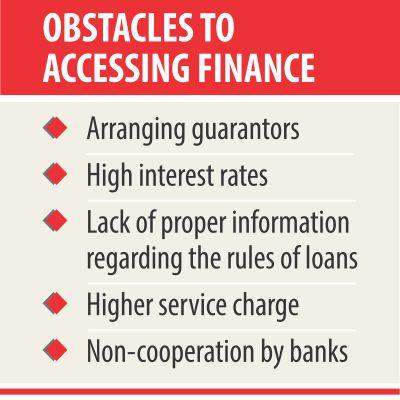Women entrepreneurs face less social barriers now: BIDS

Social barriers and a lack of access to finance, the two big obstacles for women to become entrepreneurs, have eased somewhat in the last 8-9 years, a recent study found.
Social norms and attitude towards women becoming entrepreneurs have improved between 2009 and 2017, according to the study titled 'Women Entrepreneurs in SME: Bangladesh Perspective 2017'.
“Women face some social and familial problems just because they are women. It is difficult to solve these problems overnight,” said the study conducted by the Bangladesh Institute of Development Studies (BIDS).
Some 1,510 women with enterprises were surveyed for the study with a view to gauging the changes in circumstances for women entrepreneurship in the country since 2009.
Iqbal Hossain, research associate of BIDS, presented the findings of the study at an event yesterday at the capital's Lakeshore hotel.
Some 77.5 percent of the survey respondents said they faced no hold-ups from family, up from 22.4 percent in 2009, when the last edition of the study was published.
Impediments from society too declined to 40.9 percent in 2017 from 80.2 percent in 2009.
Women-owned firms are found in all sectors of the economy, though they are most likely to be concentrated in trading-based or cottage industries.
The majority of the firms have less than 10 employees (76.3 percent), most of whom are women.
“Thus, development of women entrepreneurship will create opportunities for more female,” said the report authored by Nazneen Ahmed, Monzur Hossain and Iqbal Hossain.
The women entrepreneurs are still dependent on their families and husbands to run their businesses, according to findings of the study.
But urban women appear to have higher capacity to run the businesses individually compared to rural entrepreneurs.
The dependency is higher in case of raw material collection and marketing of the product.
The average investment made by the women entrepreneurs was Tk 22.14 lakh in 2017, up from Tk 3.65 lakh in 2009. And the investment was made with own sources mostly, followed by bank loans.
Some 58 percent of the survey respondents said they had applied for SME loans and 92 percent received it too.
But, 56.17 percent of the female entrepreneurs reported that the current SME loan amount was inadequate.
About 39 percent of female entrepreneurs reported high interest and 35 percent complained of insufficient credit limit.
For loans, about 30 percent did not need any collateral or security, while 23.6 percent reported to have kept land as collateral. Some 25 percent of the women entrepreneurs needed another person to be their guarantor.
The study identified 11 constraints that women entrepreneurs still face in accessing finance.
The constraints include: arranging guarantors, high interest rates, lack of proper information regarding the rules of loans, higher service charge and non-cooperation by banks.
The study found that some commercial banks ask for collateral from women entrepreneurs even for a loan amount less than Tk 25 lakh, which is contradictory to the regulation of the Bangladesh Bank.
“Commercial banks usually apply their own rules and judgements to approve loans,” it said, adding that many banks ask for guarantee from a male member of the family and sometimes a women entrepreneur fails to get loans if her husband is a loan defaulter.
Subsequently, the study called for a more gender-neutral credit programme and adequate amount of loans for women entrepreneurs along with a three-month grace period.
“Sensitisation of bank officials and organising awareness-raising programmes at different levels are necessary to support women entrepreneurs,” the study said, while also recommending trade fairs for women entrepreneurs.
